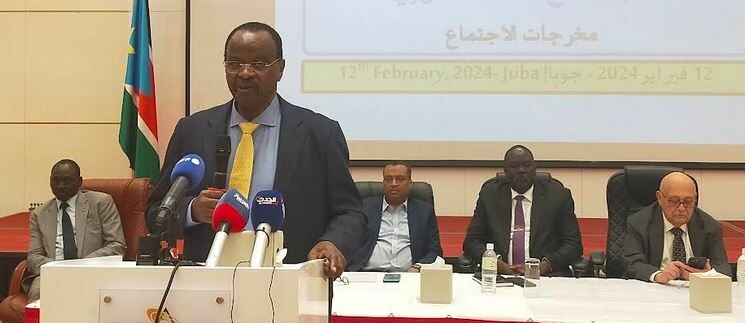Sudan’s civilian coalition, the Forces for Freedom and Change-Democratic Bloc (FFC-DB), issued a call on Monday for a comprehensive national dialogue among all Sudanese citizens to address the underlying causes of the political crisis in the country.
The FFC-DB was formed in November 2022 and consists of the Justice and Equality Movement (JEM) led by Jibril Ibrahim, the Sudan Liberation Movement faction headed by Minni Minawi (SLM-MM), the Democratic Justice Alliance chaired by former rebel official Mubarak Ardol, and the mainstream Democratic Unionist Party.
The alliance also includes the Republican Party, the Beja Nazirs Council wing chaired by Sayed Tirik, the National Movement Forces coalition of former Darfur leader El Tijani Sese, and a number of breakaway groups from mainstream political parties.
A delegation of the FFC-DB is currently in the South Sudanese capital, Juba for peace consultations organized by President Salva Kiir Mayardit.
Prof. El Tijani Sese, Chairman of the Forces of National Movement within the FFC-F-DB, spoke at a news conference following the conclusion of a consultation meeting on Sudanese-Sudanese dialogue in Juba.
He emphasized the importance of an inclusive dialogue that involves representation from all parties and stakeholders. Prof. Seisi warned that excluding any political forces or stakeholders could hinder the achievement of a lasting solution to the Sudanese crisis, potentially leading them to become spoilers.
“We believe that to attain a sustainable solution for our crisis, an all-inclusive Sudanese-Sudanese dialogue must be initiated. This dialogue should encompass all parties and stakeholders, considering the prevalent polarization in the country, such as political, military, and tribal divisions,” he stated.
He highlighted that the FFC-DB supports the Jeddah platform for negotiations with the military but emphasized that for the Jeddah platform to be effective, the agreements made on May 11th of last year must be honoured to facilitate progress in the ongoing talks.
El Tijani pointed out that since the start of the current conflict in Sudan, there has been widespread destruction in the country. He emphasized that now is the opportune moment for Sudanese citizens to seek solutions to address the root causes of the conflict, which trace back to the pre-independence era.
“It’s the right time for us to tackle the underlying issues of the Sudanese crisis. Over the past six decades since independence in 1956, the country has faced numerous challenges. One of these challenges is our inability to reach a consensus on the system and type of government. Our fellow brothers in the South are well aware of this issue,” he explained.
“There has been a clash of identity in the country, leading to a division between those who claim Arab origin and those of African origin. This division has sparked several conflicts within the country. It is now imperative for us, as Sudanese, to come to an agreement on the identity of the country, which will solidify the unity of the nation,” Prof. El Tijani emphasized.
Dhieu Mathok Diing Wol, the Secretary-General of the South Sudan mediation committee that facilitated the signing of the 2020 Juba peace agreement between the Sudan transitional government and various opposition forces, identified the primary cause of the conflict in Sudan as the division among political leaders. He stressed the necessity of a Sudanese-Sudanese dialogue to address this issue.
Dhieu stated, “This forum aims to bring together all Sudanese political parties and civil society organizations for a Sudanese-Sudanese dialogue. We believe that the division among Sudanese leaders, especially political figures, is the root cause of the conflict in Sudan. To halt the war, ensuring unity among Sudanese political groups is crucial.”
According to the UN, more than 7.2 million people have been displaced within and outside Sudan since the outbreak of fighting between the Sudanese Armed Forces and the Rapid Support Forces on April 15, 2023.




